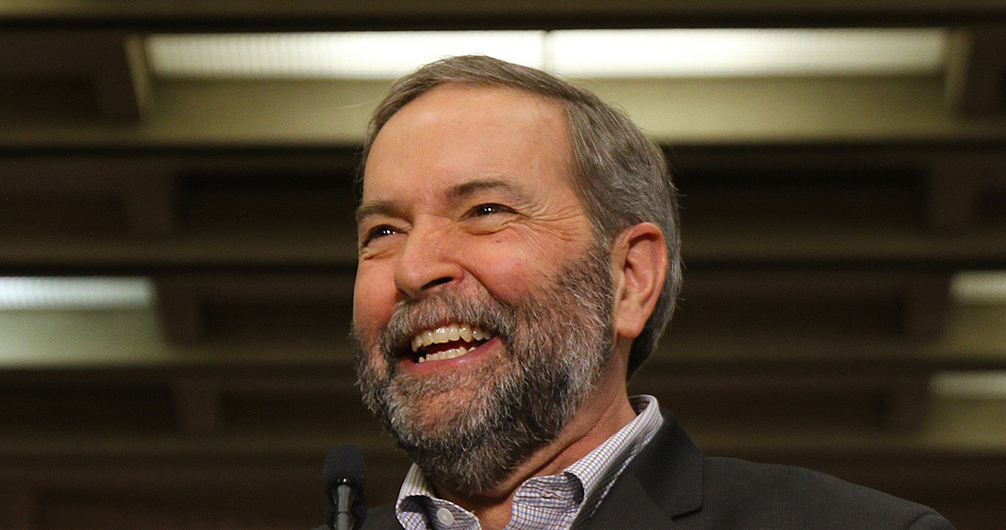Tom Mulcair is angry. Angry, angry, angry. Don’t tell me you didn’t know that. The media have been telling us that since he became leader. Repeatedly. Over and over again. He’s “angry Tom.” He bears a “grim visage.” This doesn’t mean he’s appropriately angry at Stephen Harper’s egregiously awful government. He’s angry in a bad way. He may need anger management classes. He’s kind of a leftist Stephen Harper — irrationally angry. Angry Tom even knows he’s known as Angry Tom. Last Halloween he even dressed up as an orange Angry Bird.
As it happens, I’m like you. I didn’t know it either. Personally, I’ve never seen him angry, not on TV or in person. Not once. At least not in the bad sense. So yes, I’ve seen him angry all right — when he should be angry. Hell, the entire country should be angry, outraged, at what the Harper government has done to our country. But if there’s some behind-the-scenes evidence of petulance or surliness, we the people have never witnessed it.
In fact, I’d say Mr. Mulcair is probably not as angry as he should be at reporters who insist he’s angry. He also seems almost unnaturally serene that Justin Trudeau has made the Liberals more popular than the NDP. And he has the greatest natural smile this side of Julia Roberts. Am I seeing things that aren’t there? What do the media know that I don’t?
Curiously, the media manages to hold two almost contradictory views of Mr. Mulcair simultaneously. In 2013, as many will recall, he earned unanimous raves for his leadership in Parliament, as day after day he grilled the Prime Minister in the Duffy-Wright $90,000 scandal. In 2014 he continued to win respect and praise for his exemplary conduct in the House of Commons, the Hill Times voting him “Most Valuable Politician” of the year. He was also described as “probably the best opposition leader since John Diefenbaker” by a certain Brian Mulroney.
You don’t win this acclaim if you’re always sour and sullen. Indeed, being extremely effective in the House of Commons is a pretty large step towards being considered a serious contender for the next logical job up the line.
That’s exactly the point journalist-turned-academic Paul Adams makes in iPolitics this week. Although he naturally refers to Mr. Mulcair’s “crusty personality” — it’s mandatory, I think — he goes on to say that Mr. Mulcair is actually a better leader than the NDP’s revered Jack Layton. “No one has trouble imagining Mulcair as prime minister. Mulcair has been a government minister in Quebec. In the House of Commons he projects strength, wit, intelligence and resilience. He is very much the grown-up some people wonder whether Trudeau even aspires to be. You may not want to have a beer with the man, but he looks and acts like a leader.” But why in the world wouldn’t you want to have a beer with a guy who’s strong, witty, intelligent and resilient?
Mr. Mulcair seems to demonstrates his capacity and his preparedness just about every time he speaks. In interviews, he often seems a cornucopia of information and analysis. It’s true that sometimes he gushes out his words, as if he’s compelled to share everything in his head every time he opens his mouth. Naturally, this has won him the curious reputation of being a show-off, too self-confident. Maybe he needs to be more like Goldilocks, so he can reject both overweening pride and false humility, getting things just right.
Yes, politics can be an unforgiving calling. In the category of “there ain’t no justice,” Tom Mulcair has largely not been taken seriously as a possible prime minister. Paul Adams is an outlier here. Mr. Mulcair’s palpable superiority has not translated into popular support for his party. Since Justin Trudeau became Liberal Leader, the polls have show the Liberals in the lead. Nothing Mr. Trudeau did, no gaffe, no curious opinion, no level of immaturity, no self-contradictory policy, seemed to matter. His undeniable natural appeal, superficial as it might be, was enough.
But it’s just possible that change is in the air. So far as polls can be relied on at all, Mr. Trudeau’s appeal has waned significantly in recent months, some of the slippage going to the Conservatives, some to the NDP. As a result, the first two are in a statistical tie at 32 per cent each, while the NDP has finally slid up to the low twenties. That’s 10 points behind but it’s not out of the game as the party has been for the past 18 long months. Besides, the NDP’s support among francophone Quebecois remains remarkably solid. As a result, the looming showdown between Mr. Trudeau and Mr. Mulcair will be taking place on a much more level playing field than was expected.
Which one will emerge ahead of the other is still a question. Whether either will get more seats than Stephen Harper is another. Whether the two would co-operate to deny a fourth term for Stephen Harper is a third. Mr. Mulcair has said he’s open to the two parties working together to replace the Conservatives. Mr. Trudeau has so far rejected the notion. So which one is really the angry man?
This article originally appeared in the Globe and Mail.



